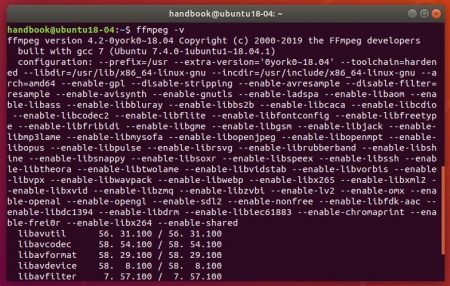
- #Instalar ffmpeg ubuntu how to#
- #Instalar ffmpeg ubuntu install#
- #Instalar ffmpeg ubuntu update#
- #Instalar ffmpeg ubuntu full#
#Instalar ffmpeg ubuntu install#
Install FFmpegīy default, Debian’s 11 repositories contain FFmpeg packages installed with the apt package manager.
#Instalar ffmpeg ubuntu how to#
You must either have access to the root password to use the su command or visit our tutorial on How to Add a User to Sudoers on Debian.
#Instalar ffmpeg ubuntu update#
Update your Debian 11 operating system to make sure all existing packages are up to date: sudo apt update & sudo apt upgrade Root or Sudo Accessīy default, when you create your account at startup with Debian compared to other distributions, it does not automatically receive sudoers status.

It is necessary to install the packages ffmpeg and ffmpeg-devel, and rebuild picard from the source RPM in order to enable PUID generation within picard on Fedora. Just install with yum yum install picardĬurrently these packages do not have support for acoustic fingerprinting because that depends on ffmpeg which isn't available in Fedora due to patent issues in ffmpeg.įfmpeg is available from the livna rpm repository. Since dependent packages PyQt4 and libdiscid are now also available in Fedora. Picard is now in the official Fedora package collection: Just make sure you have Packman's repo set up and search for those 5 RPMs to ensure they are installed. The other RPMs are available from SUSE default main repository, as well as Packman's repository ( ). Libdiscid0 is available from the same repository as Picard linked above. Libdiscid0 python-mutagen python-qt4 libofa ffmpeg
#Instalar ffmpeg ubuntu full#
If you want to ensure you've got full functionality, also make sure RPMs for the following are installed: This version does not automatically install optional things like PUID support. Select the correct one for your OpenSUSE version.

RPM builds for various SUSE versions can be found as well as 1-click installed in the OpenSUSE Software directory. Wiki.archlinux tells you how to enable the community repository, if you haven't done this already. Arch LinuxĪrch Linux has the picard package in the community repositor, simply run: sudo pacman -S picard Note that you should enable the USE flag "ffmpeg" if you want acoustinc fingerprinting, and "cdaudio" if you want to recognize CDs from your drive. To install Picard, simply run: emerge -sync Picard Qt is now included in Gentoo Portage. deb just download and type sudo dpkg -i picard_0.12.1-1_b. deb of Version 0.12.1-1 for Debian Lenny build by kaiserbert available for download here. It may be possible to run a more up-to-date version of Picard on Debian Stable using apt-pinning. Picard 1.0-1 is available in the Debian Repositories for Testing (Wheezy). Note: versions prior to 0.15 do not support NGS.

Picard 0.11-2.1 is available in the Debian Repositories for Stable (Squeeze). Latest official packages also available via the main Launchpad page. To install it run this command or use Synaptic instead. Cooker users can simply install it by running urpmi picardĪvailable in Ubuntu's universe repository since Feisty. Picard is available in the Mandriva development version Cooker in the contribs repository.

If you don't want to install third party binary packages, the source is available here. Setup and install guide for Picard under Linux.


 0 kommentar(er)
0 kommentar(er)
